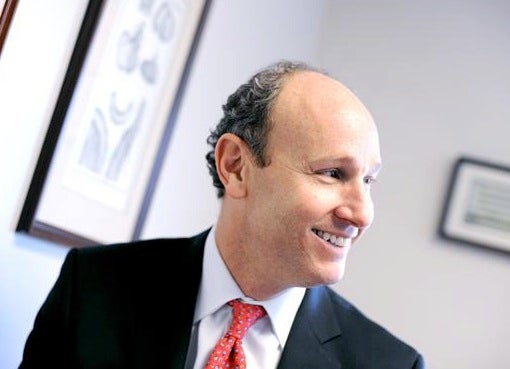Center for Translational Transplant Medicine Researchers Awarded Prestigious Grant

Posted in GUMC Stories
 The Roche Organ Transplantation Research Foundation (ROTRF) has awarded an international research grant to Thomas Fishbein, MD, executive director of the Center for Translational Transplant Medicine at Georgetown University Medical Center (GUMC).
The Roche Organ Transplantation Research Foundation (ROTRF) has awarded an international research grant to Thomas Fishbein, MD, executive director of the Center for Translational Transplant Medicine at Georgetown University Medical Center (GUMC).
The two-year grant totaling $200,000 will support research aimed at identifying characteristic microbial signatures that could predict intestinal transplant outcomes. Grant collaborators include Center for Translational Transplant Medicine scientific director and professor Michael Zasloff, MD, PhD, and Raffaele Girlanda, MD, assistant professor of surgery at Georgetown University School of Medicine, part of GUMC. Ramana Madupu, PhD, of the J. Craig Venter Institute also is a collaborator.
“Transplantation science has evolved to a point that demands laboratory and clinical collaborations to make advances,” Fishbein explains. To that end, the Center for Translational Transplant Medicine was established earlier this year to cross-fertilize the expertise of a wide variety of GUMC laboratory scientists with physicians at the MedStar Georgetown Transplant Institute, also directed by Fishbein.
Fishbein, Zasloff and their colleagues say this grant will help answer a critical question in transplantation: Is there a microbiome and/or metabolome that characterizes the normal function of a transplanted organ that has been accepted? “We have already shown that the failure to regulate microbes in the transplanted graft may lead to rejection and graft failure,” Fishbein says. “Now we ask if we can tell just from which organisms live in the graft if it will be accepted, and maybe even if we could intervene and promote a ‘healthy ecology’ that would result in tolerance of the body to the foreign organ.”
“In other words, can we identify early signatures from a graft and its environment that are indicative of long term success or of likely failure?” Zasloff explains. “Might it be that a normally functioning ‘healthy’ transplanted organ establishes a ‘normal’ population of intestinal bacteria? If we see that a normal bacterial population has not been established in the graft, might that be a warning of problems to come, such as rejection? Might we improve intestinal transplant outcomes by seeding the donor intestine with the microbiome of a ‘healthy bowel?’”
Small bowel transplantation is performed as a life-saving procedure, often for children born with congenital problems. “Although we have become increasingly successful in our efforts to transplant the small intestine, rejection and failure of the graft still occur too frequently,” Fishbein says.
One aim of their study is to provide new clinical tools allowing doctors to follow the health of transplant patients, and to provide insights into the relationship between the microbes that populate the transplanted gut and the overall outcome of the transplant.
“Currently, to monitor the health of the graft, it must be biopsied twice weekly for several months, which requires that a stoma be maintained to provide access to the interior of the graft,” Fishbein explains. “It would be of great value to have a biomarker or signature to assess the status of the graft and a easier way of obtaining it,” he says, suggesting that such a signature might be found in stool.
Fishbein and his colleague Girlanda will also examine the chemical compounds, or metabolites of microbes, produced in the graft.
“We’ve been following dozens of transplant recipients who have donated specimens,” Fishbein says. “Ultimately, we’d like to find a molecular signature for the grafts that do well and those that don’t so we can intervene sooner to help our patients.”
By Karen Mallet, GUMC Communications
